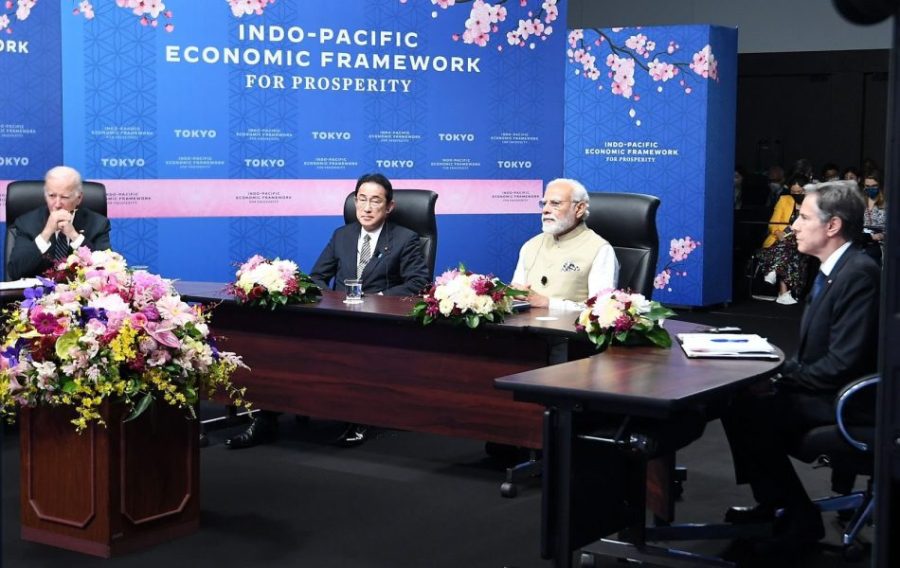
To take on China, US launches economic bloc IPEF; what does membership mean for India?

To counter Chinese influence in the Indo-Pacific region, United States President Joe Biden on Tuesday launched the Indo-Pacific Economic Framework (IPEF) in Tokyo with twelve initial partners, including India. Prime Minister Narendra Modi sat alongside the US President, Japanese Prime Minister Fumio Kishida and US Secretary of State Antony Blinken at the launch of the IPEF.
New Delhi’s participation at the highest level displayed its commitment to join forces to take on Beijing’s growing assertiveness in the region and beyond, said The Indian Express report. With China weaponising its economic heft in the Indo-Pacific, the US has now put together what is being seen as a “coalition of the willing” to take on Beijing and provide alternatives, the report added.
“IPEF reflects our collective desire to transform the Indo-Pacific region into an engine of global growth,” Prime Minister Modi said.
IPEF aims to strengthen economic partnership among participating countries to enhance resilience, sustainability, inclusiveness, economic growth, fairness, and competitiveness in the Indo-Pacific region.
Representing 40% of world GDP
Leaders and officials joined in virtually from Australia, Brunei, Indonesia, Republic of Korea, Malaysia, New Zealand, Philippines, Singapore, Thailand, and Vietnam. Together, these countries represent 40 per cent of world GDP.
The economic initiative came a day before the summit of the Quad leaders in Tokyo — the second in-person meeting after the summit in Washington DC last September.
The US President, while launching IPEF, said that this framework will help lower costs by making its supply chains more resilient in the long term. He said that this will be achieved through IPEF by establishing an early warning system, mapping critical mineral supply chains, improving traceability in key sectors, and coordinating on diversification efforts
Modi stresses on three Ts
Thanking President Biden for this “important initiative”, Modi said, “I believe that there should be three main pillars of resilient supply chains: Trust, Transparency and Timeliness. I am confident that this framework will help strengthen these three pillars, and pave the way for development, peace and prosperity in the Indo-Pacific region.”
IPEF’s four pillars are: fair and resilient trade (including digital, labour, environmental and other standards); supply chain resilience; infrastructure, decarbonisation and clean energy; and, tax and anti-corruption.
With regard to India joining IPEF, the US State Department spokesperson had earlier said, “India’s clean energy transition is in the interests of the entire world, and we need to support India in achieving the ambitious clean energy targets that Prime Minister Modi announced at COP-26. We are already working with India and other partners to mobilise the necessary financing and technology to achieve these goals.”
Prioritising ‘flexibility and inclusion’
The framework of IPEF has been designed prioritising “flexibility and inclusion”. Participating countries can therefore join IPEF without necessarily joining all the four pillars of the framework, which is also in India’s interest.
With 60 per cent of the world’s population, the Indo‑Pacific is projected to be the largest contributor to global growth over the next 30 years, President Biden said adding, “US foreign direct investment in the region totalled more than $969 billion in 2020 and has nearly doubled in the last decade, and we are the leading exporter of services to the region, helping fuel regional growth.”
Also read: What’s the 4-nation Quad, what led to its formation? Know all here
He said that the US will also seek strong labour and environment standards and corporate accountability provisions. “We will pursue concrete, high-ambition targets that will accelerate efforts to tackle the climate crisis, including in the areas of renewable energy, carbon removal, energy efficiency standards, and new measures to combat methane emissions,” he added.

